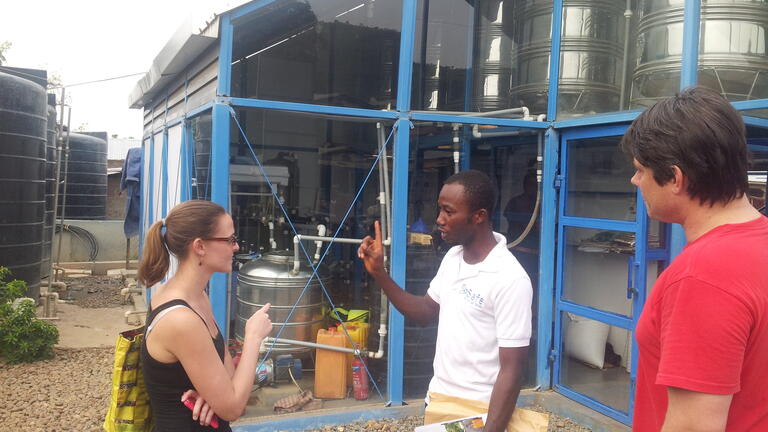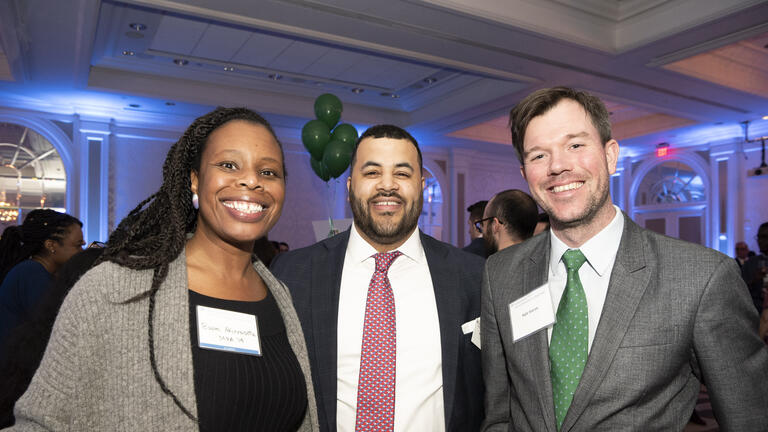SPRING 2024 CAPSTONE WORKSHOPS
| Capstone Workshop |
Project Title |
Faculty Advisor |
| Acted (Sri Lanka) |
Rethinking Community Driven Recovery |
Samir Elhawary |
| Bain & Company |
Devising a Framework to Determine the Return on Investment (ROI) for AI |
Hans-Martin Boehmer |
| Bank of America |
Can Generative AI Help Financial Institutions Mitigate Risks? |
Elizabeth Cartier and Neal Pollard |
| Bonn Institute |
Non-Profit Scaling: How can a German Media Development Organization go Global? |
Samantha McCann |
| Booz Allen Hamilton |
Climate and Artificial Intelligence (AI) – Harnessing the Whole of Government to Improve Climate Resiliency |
Tim Meyer and Ulrike Zeilberger |
| Calstart |
Evaluating delivery fleets to right-size operations and transition to zero-emission |
Damian Busch |
| Captona |
The Inflation Reduction Act as a Driving Force behind Clean Energy Investments in the United States |
Jeanne Fox |
| Citi Community Banking |
Going Green for Affordable Housing |
Carol O'Cleireacain |
| City of Buenos Aires |
Accessing Financing for City Climate Leadership on the Road to COP28 |
Daniel Zarrilli |
| Communities Speak |
Communities Speak:Turning Data and Community Engagement into Policy in New York City |
Judy Pincus |
| Crédit Agricole CIB |
Analysis of Carbon-Reducing Investments that are Supported by the Inflation Reduction Act |
Ryan Hakim |
| Cyber Defense Assistance Collaborative (CDAC) |
Improving Cyber Defense Assistance to Meet the Challenge of Hybrid Warfare |
Daniel Dobrygowski |
| Dell Technologies |
Driving Product-Level Sustainability Data in Dell's Supply Chain |
Holly Hammonds |
| Desai & Associates (D&A) |
SDG Projects and Impact Investor Landscape in Asia – Roadmap for Innovative Financing |
Isabelle Delalex |
| Equinor |
Fiscal Feasibility of Countries’ Support Schemes towards their Climate Policies and Targets |
Luisa M. Palacios |
| Eurasia Group |
The Rise of Geopolitical Pivot States |
Markus Jaeger |
| European Bank for Reconstruction and Development |
Green-Digital Nexus: Accelerating Green Economy Transition through Digital Technologies |
Mariela Machado Fantacchiotti |
| Federal Reserve Bank of New York |
Transmission and Impact of High Interest Rates |
Daniel Waldman |
| Goldman Sachs |
Geopolitical Fragmentation: Swing States and the Risk of Western Sanctions |
Robert Kopech |
| Government of Estonia |
Estonia: Media Freedom, Human Rights and Global Outreach in a Time of Global Turbulence |
Jenik Radon |
| Government of French Polynesia, Office of the President |
French Polynesia: Murky Waters — The Challenge and Risks of Deep-Sea Mining “Development” |
Eric Chang |
| Government of Kosovo: Ministry of the Economy |
Energy (Reform) and Culture: The Necessary Drivers of Kosovo’s Path to Economic Growth |
Mahima Achuthan |
| Government of Mexico |
Mexico: Challenge of Achieving Energy Development, Domestic Economic Growth and Social Acceptance |
Jenik Radon |
| Government of Nigeria: Nigeria Sovereign Investment Agency (NSIA) |
Developing Nigeria’s Net Zero Economy: Carbon Markets, ITMO Framework and Article 6 Mechanism |
Christine Capilouto |
| Human Rights Watch |
Policy Proposals to Bring Justice to Victims of US Torture in Iraq |
Andrew Heinrich |
| IFC ILO Better Work Jordan |
Assessing the Challenges of Bangladeshi Migrant Workers’ Journey to Jordan |
|
| Inter-American Development Bank |
Blended Finance for the Transition to Net Zero Carbon Emissions in the LAC Region |
Fernando Sotelino |
| International Finance Corporation, Financial Institutions Group |
Agricultural Insurance to Assist Smallholder Farmers in the Adoption of Sustainable Farming Practices- Integrating Area Yield and Satellite Indexes in Insurance and Humanitarian Funds |
Daniel Osgood |
| International Organization for Migration (IOM) |
Pursuit of Justice for Migrants through codification of International Migration Law |
Ruth Mukwana |
| International Peace Institute |
United Nations- African Union Partnerships in Peace Operations |
Gizem Acikgoz |
| Lisbon City Council |
Monitoring System for the Transparency and Corruption Prevention Strategy |
Andre d'Almeida |
| Local Policy Lab |
Strengthening Democracy and Civic Engagement in U.S. Cities: A Tool Kit for Local Government Leaders |
Nicholas Stabile |
| McKinsey & Company |
Never let a Cyber Crisis go to Waste: Learning from Hacks and Cybersecurity Incidents |
Evan Wolff |
| Médecins Sans Frontières (MSF) |
Methodologies and Innovations for Improving Coordination of Support Services for Migrants in Central America |
Elen Cristina Costigan |
| Mercy Corps |
Review and Recommendations to Support Women- and Youth-Led/Serving Civil Society Capacity Strengthening |
|
| Moody's Investors Service |
Do Investment Disputes in Latin America have a Negative Effect on Economic and Investment Prospects or Fiscal Performance? |
Thomas Byrne |
| New Leaf Climate |
US Innovative Financial Institutions for Nature |
Ralph Schmidt |
| New York City Housing Authority (NYCHA) |
Maximizing Economic Opportunities for NYCHA Residents and Other Low-Income New Yorkers |
Thomas Quaranta |
| New York City Mayor's Public Engagement Unit |
What’s in a Name? Considering a Rebrand and Revisioning of the mission of NYC Mayor's Office Public Engagement Unit |
Hagar Chemali |
| Nigeria Rural Electrification Agency |
Developing E-mobility Infrastructure in Existing Microgrid Projects Across Nigeria |
Christine Capilouto |
| Permanent Mission of Portugal to the United Nations |
How can a Country Project its Soft Power in the United Nations? |
Jose Acero |
| PriceWaterhouseCooper (PwC) |
What would a Quantum Strategy Look Like for a Fortune 500 Company? |
Elana Broitman |
| Pro Mujer |
Mainstreaming Gender Lens Investing in the Financial Sector in Guatemala: An Ecosystem Analysis. From Challenges to Best Practices: A Pathway to Equity |
Ingrid Dyott |
| Renew Power |
Accelerating Net Zero Transitions Considering Article 6 of the Paris Agreement |
A.J. Goulding |
| Report for the World |
Understanding the Impact of Locally Driven, Public Interest Journalism Across the Globe |
Anya Schiffrin |
| Rio de Janeiro City Hall- G20 Committee |
Urban Climate Policy on the Global Stage- Rio in the G20 |
Daniel Zarrilli |
| Rocky Mountain Institute (RMI) |
Emerging Green Hydrogen Ecosystem in India |
A.J. Goulding |
| Roland Berger |
Proving the Case for Reconversion of Coal Plants in the United States |
Gregory Alexis Stoupnitzky |
| San Francisco Board of Supervisors |
The Future of Downtown San Francisco |
Lincoln A. Mitchell |
| The Sentry |
Conflict Financing, Sanctions, and Conflict Resolution in Sudan |
Marc Jacquand |
| UNICEF Regional Office for South Asia |
Localization in Humanitarian Settings – An Integrated Approach between Government, Business, and Community |
Suzanne Hollmann |
| United Nations Department of Economic and Social Affairs (UN DESA) |
Assessing the Global Landscape of International Development Cooperation |
Isabelle Delalex |
| United Nations Development Programme (UNDP): Innovation for Development |
Response and Renewal in Ukrainian Cities: Systems Thinking Approaches Towards Sustainable Adaptation and Resiliency |
Nilda Mesa |
| United Nations Development Programme (UNDP): Sustainable Energy Hub |
Creating an Opportunity Space for Green Hydrogen in West Africa |
Rhiannon Gulick and Ellen Morris |
| United Nations Permanent Forum for People of African Descent |
Addressing Racial Inequalities in America- A United Nations SDG Audit of US Black Communities |
Linda J. Mann |
| United States Department of Commerce, International Trade Administration |
Ensuring a Level Playing Field: Tariff Evasion in the Global Steel Market |
Daniel Rosen |
| United States Department of Defense, Center for Excellence in Disaster Management and Humanitarian Affairs |
Data Driven Policy Actions to Mitigate and Adapt to Climate Change Threats in the COFA Countries |
Joseph Pfeifer |
| United States Department of Defense, DARPA |
Vanguard Technology: Next-Generation Methods for National Security |
Nancy W. Collins |
| United States Department of Defense- Joint Task Force North (JTF-N) |
Narcosurgents: Applying Counterinsurgency Lessons in Mexico |
Benjamin Reames |
| United States Department of Defense, National Security Innovation Unit (NSIN) |
Application of Technology and Innovation to Urban Conflict and Casualty Prevention in Ukraine |
David Bonfili |
| United States Department of Energy, National Nuclear Security Administration |
How to Smuggle Nukes: Africa Chapter |
Daniel Madden |
| United States Department of State, Global Engagement Center |
Great Power Competition with a focus on Influence Operations Against India |
Robert McKenzie |
| United States Department of State, The Bureau of Oceans and International Environmental and Scientific Affairs, and Bureau of Arms Control, Verification, and Compliance |
Advancing U.S. Space Policies and Programs Internationally through Bilateral and Multilateral Engagement and Cooperation |
Jack Pan |
| United States Department of the Treasury |
Expanding Access to Payments: Domestic and Cross-Border Challenges and Opportunities |
Merit E. Janow |
| United States International Development Finance Corporation |
Private Sector Investment in Conservation and Coastal Resilience in the Caribbean |
Hans-Martin Boehmer |
| Watchlist on Children and Armed Conflict |
Indoctrination and New Forms of Use of Children in Armed Conflict |
Laura Perez |
| Wood Mackenzie |
At the Edge of Grid Innovation: Great Britain’s Flexibility Markets |
Jeanne Fox |
| World Bank Group, Competitiveness & Innovation Global Practice |
Reward Green Countries: Exploring the Case for ‘Pure Play’ Sovereign Green Bonds |
Michelle Greene |
|
| |
Information for Capstone Students, MIA, MPA, AND MPA-DP
A core requirement for the Master of International Affairs (MIA), Master of Public Administration (MPA), and Master of Public Affairs in Development Practice (MPA-DP), the Capstone Workshops give students an opportunity to put learning into practice. Serving as a culminating educational experience for the Master of International Affairs and Master of Public Administration degree programs, students in all of the concentrations, except for the Economic and Political Development (EPD) concentration, complete a Capstone Workshop in their final semester. Students are organized into small consulting teams (between 4 to 8 students per team) and assigned a substantive, policy-oriented project with an external client. Clients include public agencies (from the local to national level), international NGOs and multinational organizations, and major firms in the private sector—recent examples include Barclays, Citi Global Wealth Management, Federal Reserve Bank of New York, Mercy Corps, New York City Mayor’s Office, United Nations University Centre for Policy, and the World Bank Group. Student teams, working under the supervision of a faculty expert, answer a carefully defined problem posed by the client. Each team produces an actionable report and an oral briefing of their findings at the close of the Capstone that is designed to translate into real change on the ground.
SIPA Capstone Workshops are available to MIA, MPA and MPA-DP students.
For more information, please refer to our Frequently Asked Questions (FAQs) page for students.
Capstone Workshops Requirements by Program
The following degree programs include capstone workshops as part of their curriculum. See the degree program pages for more details.
Master of International Affairs (MIA) »
Master of Public Affairs (MPA) »
Master of Public Administration in Environmental Science Policy (MPA-ESP) »


